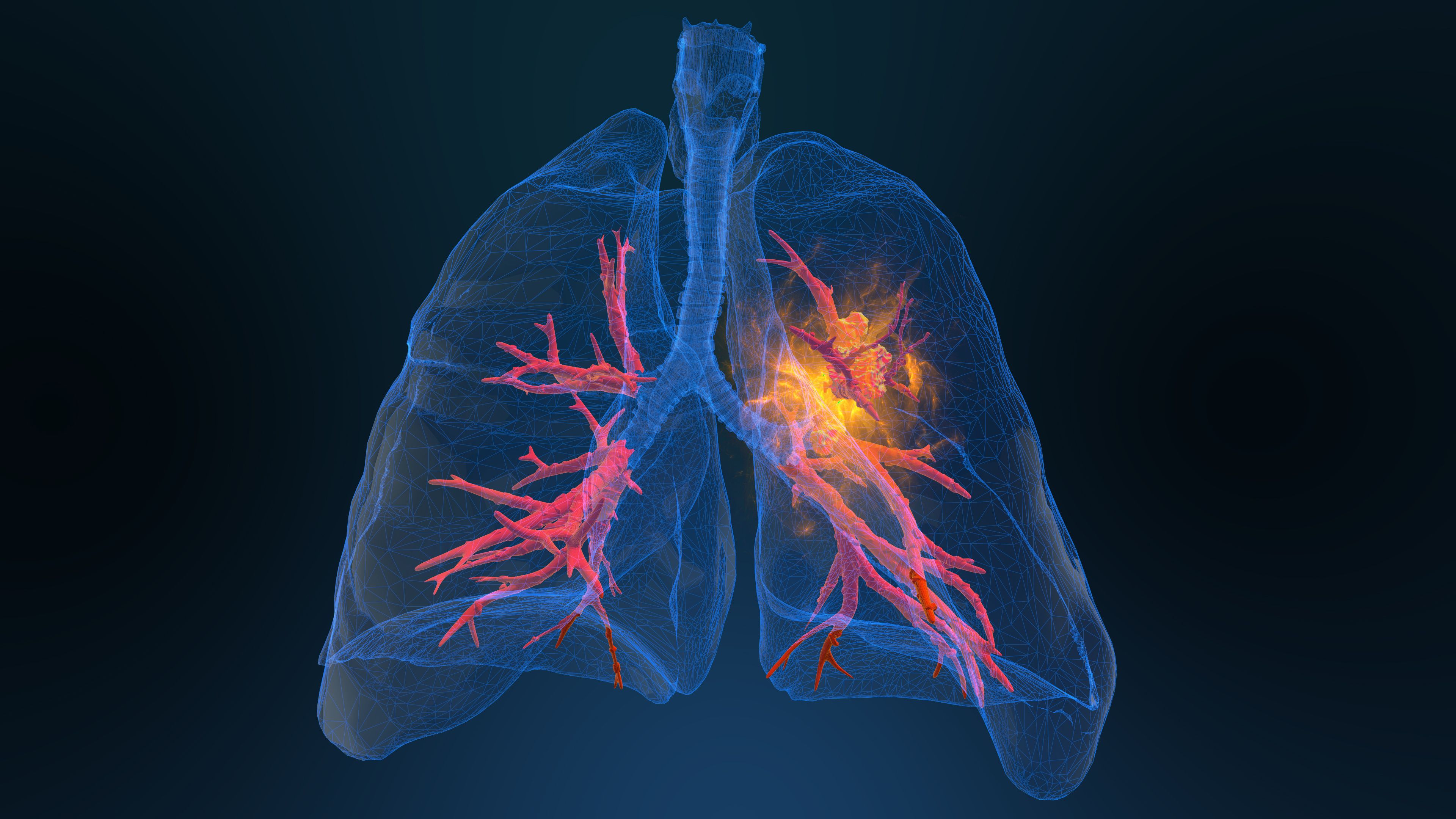News
Article
Topline Data Demonstrate Survival Improvement With Amivantamab-vmjw for NSCLC
Author(s):
The MARIPOSA study evaluated amivantamab-vmjw (Rybrevant; Janssen Pharmaceutical) in combination with lazertinib compared to osimertinib and compared to lazertinib monotherapy in the first-line treatment of EGFR-mutated non–small cell lung cancer.
Janssen Pharmaceutical Companies of Johnson and Johnson have announced positive topline results from a study of amivantamab-vmjw (Rybrevant) in combination with lazertinib in the treatment of non–small cell lung cancer (NSCLC). The combination demonstrated a statistically significant and clinically meaningful improvement in progression-free survival as first-line treatment in patients with locally advanced or metastatic epidermal growth factor receptor (EGFR)-mutated NSCLC.1
appledesign - stock.adobe.com

Amivantamab-vmjw is a bispecific antibody that targets EGFR and mesenchymal-epithelial transition.1
“Positive topline results from the MARIPOSA study reinforce the potential of the [amivantamab-vmjw] and lazertinib (Leclaza; Yuhan, Janssen) combination in frontline EGFR-mutated non-small cell lung cancer as a future standard of care,” Peter Lebowitz, MD, PhD, head of global therapeutic in Oncology at Janssen Research & Development LLC, said in a statement. “As a combination targeted regimen, [amivantamab-vmjw] and lazertinib inhibit critical oncogenic driver pathways and activate the immune system to address disease in multiple ways.”1
MARIPOSA (NCT04487080) was a randomized, open-label trial that included 1074 patients to evaluate amivantamab-vmjw in combination with lazertinib compared to osimertinib and compared to lazertinib monotherapy in the first-line setting. Patients had locally advanced or metastatic NSCLC with EGFR exon 19 deletion (ex19del) or substitution mutations. Key secondary endpoints included overall survival (OS), objective response rate, duration of response, intracranial PFS, PFS after first subsequent therapy, and time to symptomatic progression.1 Furthermore, the combination demonstrated a safety profile consistent with results previously reported for the combination.1
An interim OS analysis showed a trend that favored the combination compared to osimertinib. Investigators plan to follow patients in the study for subsequent OS analyses, determining the statistical and clinical significance of OS for the combination.1
“Patients with treatment-naïve EGFR-mutated non-small cell lung cancer has historically been treated with EGFR [tyrosine kinase inhibitors], but these agents invariably lead to resistance and disease progression when used as monotherapy,” Alexander Spira, MD, PhD, FACP, director of the Virginia Cancer Specialists Research Institute said in the statement. “These promising data from MARIPOSA underscore the potential for the [amivantamab-vmjw] and lazertinib regimen to advance treatment beyond TKI monotherapy.”1
This study is the third phase 3 trial for amivantamab-vmjw this year, following PAPILLON (NCT04538664) and MARIPOSA-2 (NCT04988295).1 The results of the MARIPOSA-2 study demonstrated that amivantamab-vmjw with chemotherapy, with or without lazertinib, produced statistically significant and clinically meaningful improvements in PFS compared to chemotherapy alone for those with locally advanced or metastatic EGFR ex19delor L858R substitution NSCLC after disease progression.1,2
Additionally, in the PAPILLON study, the drug in combination with carboplatin-pemetrexed in the first-line setting met its primary endpoint of a statistically significant and clinically meaningful improvement in PFS for patients with locally advanced or metastatic NSCLC with EGFR exon 20 insertion mutation.1,3
In 2021, amivantamab-vmjw received accelerated approval from the FDA, following a breakthrough therapy designation.2,3 The drug is approved for the treatment of adults with locally advanced or metastatic NSCLC with EGFR exon 20 insertion mutation whose disease progressed either on or after platinum-based chemotherapy.2
References
- Landmark phase 3 MARIPOSA study meets primary endpoint resulting in statistically significant and clinically meaningful improvement in progression-free survival for Rybrevant (amivantamab-vmjw) plus lazertinib versus osimertinib in patients with EGFR-mutated non–small cell lung cancer. News release. Johnson and Johnson. September 28, 2023. Accessed September 28, 2023. https://www.jnj.com/landmark-phase-3-mariposa-study-meets-primary-endpoint-resulting-in-statistically-significant-and-clinically-meaningful-improvement-in-progression-free-survival-for-rybrevant-amivantamab-vmjw-plus-lazertinib-versus-osimertinib-in-patients-with-egfr-mutated-non-small-cell-lung-cancer
- McGovern G. Phase 3 study demonstrates amivantamab-vmjw is safe, effective in improving PFS in patients with NSCLC. Pharmacy Times. September 7, 2023. Accessed September 28, 2023. https://www.pharmacytimes.com/view/phase-3-study-demonstrates-amivantamab-vmjw-is-safe-effective-in-improving-pfs-in-patients-with-nsclc
- Gallagher A. Supplemental biologics license application submitted to expand approval of Rybrevant for NSCLC. Pharmacy Times. August 29, 2023. Accessed September 28, 2023. https://www.pharmacytimes.com/view/supplemental-biologics-license-application-submitted-to-expand-approval-of-rybrevant-for-nsclc






